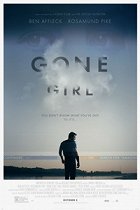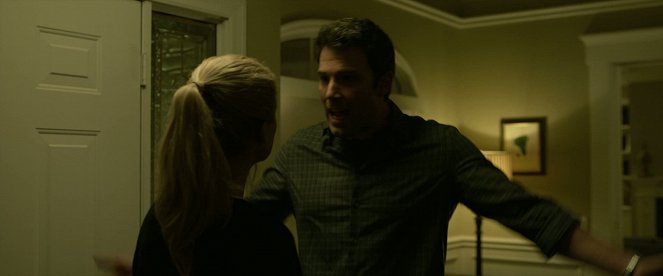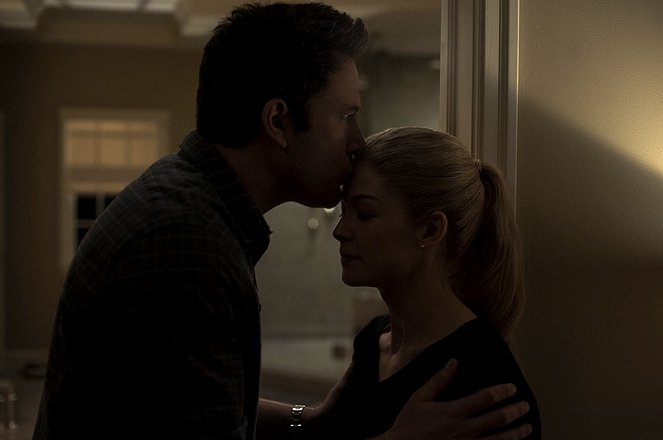Directed by:
David FincherScreenplay:
Gillian FlynnCinematography:
Jeff CronenwethCast:
Ben Affleck, Rosamund Pike, Neil Patrick Harris, Tyler Perry, Carrie Coon, Kim Dickens, Patrick Fugit, David Clennon, Lisa Banes, Missi Pyle, Emily Ratajkowski (more)VOD (2)
Plots(1)
GONE GIRL unearths the secrets at the heart of a modern marriage. On the occasion of his fifth wedding anniversary, Nick Dunne (Ben Affleck) reports that his beautiful wife, Amy (Rosamund Pike), has gone missing. Under pressure from the police and a growing media frenzy, Nick's portrait of a blissful union begins to crumble. Soon his lies, deceits and strange behavior have everyone asking the same dark question: Did Nick Dunne kill his wife? (20th Century Fox)
(more)Videos (2)
Reviews (18)
Who wouldn't want to open their wife's skull and see what's going on inside it? Best Fincher since 2007. Especially the first half is brilliant. The way in which Fincher managed to elegantly embody two unreliable book narrators into exciting cinematic speech is worthy of (un) academic admiration. Especially since the film does not achieve the stratification and urgency of the book, but it is able to balance it with predatory irony and scathing exaggeration. Criticism of the crises of a troubled society, which is oriented only by reflections and media images, is carried out with ease and without any lameness. I have problems more so with the second half, which is slightly camp, and, especially through the irresistibly psychopathic caricature of the main character, the film makes its work a little easier when it runs from subtle social criticism and attentive satire of a marital crisis to shocking twists. Moreover, in some of the "dark" scenes, it seems as if Ben Affleck (deprived of the opportunity to defend himself with his smile) reaches the limits of his acting. I can't say that Fincher convinces me indefinitely about the meaningfulness of all of the parts of his game, but I admit, without torture, that even taking into account the complexity of the original and all the pitfalls of the material, my initially slightly indifferent attitude transformed into deep recognition. I’d like to watch this Gone Bitch again after some time has passed.
()
Gone Girl is a compact mosaic of events chiseled to perfection. Surgically confident and precisely timed in every scene and every shot. That is why, and for my admiration of David Fincher’s talent, I regret that it is also very cold and impersonal. That it does not allow the audience to engage, only to observe from a distance. That’s all part of the maestro’s game, but it’s a shame. Electronic music composers Trent Reznor and Atticus Ross once gave the musical identity to the world of heroes who created an internet phenomenon out of ones and zeros. Original and effective. But what is this detached, chemical-like music doing in the story of a relationship between two people? Wouldn’t Gone Girl be an even better movie had it been driven by passion and emotion? It is a film about the disintegration of a marriage that looks and sounds the same as Steven Soderbergh’s thriller about a lethal global virus.
()
Spoilers ahead. A five-act play about marriage and engaging storytelling. The film not only preserves the book’s “he said/she said” structure, but further thematises the telling of various versions of the same story through words and images. From the storytelling perspective, Gone Girl is notable in both how the film communicates with the viewer and how the individual narrative segments communicate with each other. One gets the impression that the information in Amy’s diary is a response to what Nick is experiencing and vice versa. The diary flashbacks trigger events in the present (the discovery of Amazing Amy’s artifacts) and the returns to the present are handled with fluid graphic transitions (the kiss – wiping of the mouth), thanks to which the shots organically complement each other. As the co-creator of Nick’s story, Amy is thus seemingly present even in scenes in which she does not physically appear (in the book, this impression is achieved through Nick’s feeling that Amy is looking over his shoulder and commenting on the text of the novel that he is writing). Thanks to the “cooperation” between the information from the past and that from the present, both storylines can serve to convey evidence supporting the intensification of the police investigation (which Flynn does not needlessly delay here, making better use of it than in the book to tighten up the narrative). Similar communication takes place at a higher level between the first and second parts of the film. In the second part, there are variations on scenes from the first part, with a different allocation of the roles of prey and predator (first Nick and then Amy suspects that someone is moving around in front of the house) and different motivations for their actions (the goal of “finding Amy” remains, but until the final act, it is not her life that is in danger, but Nick’s). ___ Like the composition of some of the shots, which are terrifying in how inhumanly perfectly centred they are, the similarity of whole scenes is confirmation of Fincher’s obsession with symmetry. Even so, I don’t consider the moral relativism of either the book or the film to be as well-honed as their creators would have liked. Against a sadomasochistic sociopath and murderer stands a rather ordinary guy who “only” lies, treats his own father like shit and has been unfaithful to his wife. ___ I suspect that the negative depiction of the female protagonist was the reason that the book appealed to Fincher. Nevertheless, women who have been betrayed may feel a certain satisfaction from the fact that Amy exclusively uses feminine weapons to symbolically castrate her husband (for which we are prepared by Go’s “Protect Your Nuts” T-shirt in the opening scene). Her power does not consist in thinking and acting like a man. ___ Fincher’s handling of the audio-visual form of every shot is more masterful from film to film. Minor adjustments in colour, pacing and shot size are used to adapt the overall noirish atmosphere with cold colours into a clinical police procedural here, a toxically cynical relationship satire there (along the lines of Who's Afraid of Virginia Woolf?) and even a splatter flick. Instead of switching between thriller, biting social commentary and dark comedy, these individual types are layered on top of each other, so that we can view each scene from multiple (genre) perspectives and admire the precision with which Fincher takes care to ensure that none of the genres dominates and that the viewer cannot experience the satisfaction that comes with the fulfilment of a particular formula. The ending is as unsatisfying (in the sense of not being a typical Hollywood ending) as what the film says about certainty in marriage and honesty in relationships generally. 85%
()
(less)
(more)
I haven't seen a movie this suspenseful in a long, a truly long time. It's so terribly suspenseful that after the first line I was ready to rewind the film to the end to see how it would turn out. It blends so many things that I love in movies. Unexpected twists and turns, engaging narration from the main heroine, and... one big game. And the best part is the insightful, even clinical way in which it's filmed. I have no complaints about the cast either. I'm simply and plainly blown away and if anyone asks me for a movie recommendation this year, this one will immediately jump out at me. Anyway, I'm off to buy the book this weekend. 5 stars.
()
When an author adapts his own (so complex) work for the silver screen, it rarely bodes well because there is too much personal involvement. This doesn’t apply to Flynn, who wasn’t afraid of cutting up and changing her "mirror holding, not-so-much-crime-thriller, satirical, cynical bestseller about relationships" to suit the needs of another medium. So she got rid of everything not directly related to the central storyline. Due to this there is drastically less about those two (and so the main snag with the original book, that these two are puppets who behave according to the momentary needs of the story and that they aren’t living characters, becomes much more apparent) and more about the investigation storyline and the influence of the media on public opinion. And so the movie did include Nick’s unfulfilled ambitions as a writer and Amy’s magazine quizzes in everyday practice. Even the diary entries are edited to the bare minimum; it’s simply whittled down to a stump. And as much as this approach didn’t work in the book, the better it works on the movie screen; especially Fincher’s so apt, coolly depersonalized concept which is taken a level higher by the disquieting hypnotic background music from the Reznor/Ross duo. In any case, the most important parts of the book remained. The evolution of the Nick/Amy relationship is cleverly written, like the best horoscopes. I mean in a way that any couple in a long term relationship can recognize themselves in some respect (I’m talking about the first half here). And in this situation you might take it personally, because this creates the impression that "this could happen to you too". If it isn’t happening already...
()



Ads